The term ‘folk music’ encompasses a wide variety of sounds and styles.
That was never more apparent than in the late sixties and early seventies. Traditional guitar strumming troubadours were still around – and in the case of acts from James Taylor and John Denver, selling better than ever.
But there was much more, as three recent books make clear. Together, they underscore just how vital and varied the folk scene was for a season.
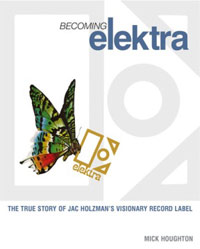 Becoming Elektra: The True Story of Jac Holzman’s Visionary Record Label, by Mick Houghton (Jawbone), tells the story of this unique label and the man who made it all happen.
Becoming Elektra: The True Story of Jac Holzman’s Visionary Record Label, by Mick Houghton (Jawbone), tells the story of this unique label and the man who made it all happen.
Formed in 1951, Elektra Records’ roster was rooted in folk music. Be it Ed McCurdy and Jean Ritchie singing traditional numbers, Oscar Brand offering topical humor, or Theodore Bikel singing Jewish Folk songs, they were all hand-picked by Jac Holzman.
As the sixties unfolded, Phil Ochs brought a political sensibility to the proceedings, while more introspective writers like Fred Neil and Tim Buckley dealt with personnel politics.
By 1966, Elektra had gone electric, with the Paul Butterfield Band and Love leading the charge. The following year the label had its first number one hit, with the Doors’ ‘Light My Fire.’ While folk was never abandoned – Judy Collins remained for over two decades – the updated roster saw acts as diverse as Carly Simon, Bread and Queen bring significant commercial success to the label.
Elektra released a number of gospel-informed LPs over the years, including straight ahead efforts like 1964’s Sweet Hallelujah by the Christian Gospel Choir, Jeanie Greene’s 1971 effort, Mary, Called Jeanie Greene, which offered a southern-fried version of the gospel; to legendary Bahamian guitarist Joseph Spence unique take on traditional gospel numbers.
There were curios, too, like Methuselah’s Matthew, Mark, Luke And John, which featured plenty of biblical imagery – if rather dodgy theology – coupled with a rock beat.
Rather than emulate their American peers, folk musicians in the U.K. followed an entirely different path. The playing was at a whole other level, with the likes of Davey Graham, Bert Jansch and John Martyn rewriting the rules on how to play both electric and acoustic guitar. There was a propensity for adventure; Pentangle added a jazz rhythm section and performed Charles Mingus compositions alongside traditional madrigals.
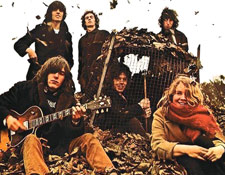 While the Yanks were getting back to the country – be it Colorado, Carolina, or California – Fairport Convention decided to explore their real roots; all the way back to the 16th century ballads of their forefathers. The songs they discovered were full of blood, lust and revenge, and precious little in the way of peace and love.
While the Yanks were getting back to the country – be it Colorado, Carolina, or California – Fairport Convention decided to explore their real roots; all the way back to the 16th century ballads of their forefathers. The songs they discovered were full of blood, lust and revenge, and precious little in the way of peace and love.
The result – 1969’s Liege & Lief -was the single most important album to come out of the fertile folk scene.
The group boasted a wealth of talent; Sandy Denny, Richard Thompson, Ashley Hutchings and Ian Matthews would all go on to significant solo careers, and the long serving rhythm section of Dave Mattacks and Dave Pegg showed up on literally hundreds of albums over the years. The group produced a number of sterling offshoots, including Steeleye Span, Fotheringay, and the Albion Band.
The Fairport family has been well served in the CD era, with a number of fine compilations. Thomson and Denny in particular, have received multiple box set treatments, and each is the subject of a significant new archival release.
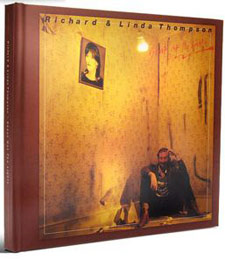 After leaving Fairport in 1971, Thompson recorded a series of albums with his then wife Linda that coupled literate yet expressive songwriting with flawless musicianship. Their final effort together, 1982’s Shoot Out The Lights, was an emotionally harrowing song cycle, written and recorded as the marriage was coming to an end. Songs like ‘Don’t Renege On Our Love,’ ‘Walking On A Wire,’ and ‘Did She Jump Or Was She Pushed?’ dealt with infidelity, trust, and related matters from an all-too familiar perspective.
After leaving Fairport in 1971, Thompson recorded a series of albums with his then wife Linda that coupled literate yet expressive songwriting with flawless musicianship. Their final effort together, 1982’s Shoot Out The Lights, was an emotionally harrowing song cycle, written and recorded as the marriage was coming to an end. Songs like ‘Don’t Renege On Our Love,’ ‘Walking On A Wire,’ and ‘Did She Jump Or Was She Pushed?’ dealt with infidelity, trust, and related matters from an all-too familiar perspective.
The album was already an essential purchase, but Rhino Handmade’s new expanded edition offers even more; a second, live disc taken from the subsequent American tour to promote the album. By then, the gloves were off; Linda physically attacked Richard onstage on more than one occasion. The performances, however – many taken from the final show before she walked out on the tour – are mesmerizing; intense and focused, and, despite such dire circumstances, presenting all involved at their very best.
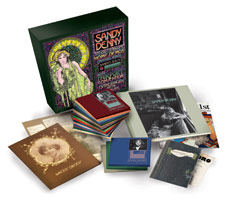 When Sandy Denny died in 1978, the world lost one of the all-time great voices. Only 31 years old at the time, she was undisputedly the preeminent vocalist in British folk rock music, possessing one of the most beautiful, haunting voices ever to grace a recording studio or stage. While it never translated to hit records or sales, thankfully, she left a formidable catalogue.
When Sandy Denny died in 1978, the world lost one of the all-time great voices. Only 31 years old at the time, she was undisputedly the preeminent vocalist in British folk rock music, possessing one of the most beautiful, haunting voices ever to grace a recording studio or stage. While it never translated to hit records or sales, thankfully, she left a formidable catalogue.
Pulling together all her previously released work, from early stints with the Alex Campbell Folk Group and the Strawbs, through Fairport and on to Fotheringay and her solo albums, Sandy Denny is a strong contender as the mother of all box sets.
The packaging is gorgeous, with photos, handwritten lyrics, a hardbound book featuring testimonials from peers and fans, period interviews, and much more. But none of that would matter if it wasn’t for the music. At 19 discs, the box clocks in at over 21 hours.
Guest appearances, live recordings, BBC transmissions, it’s all here. After the previously released material comes another eight discs, for the most part unavailable until now. Solo demos, an entire 1974 Fairport concert – the list is long and impressive.
This is hardly barrel scraping; despite the massive amount of material, there’s nary a duff track to be found. Like Bob Dylan, the scraps on Denny’s cutting room floor contain gold. Individual song titles show up more than once, but the performances vary enough that each is worth hearing.
As exciting and varied as the music could be, these acts shared a common trait; few made a dent outside of their home turf. Many barely even made an impression at home; Nick Drake and Vashti Bunyan received belated recognition decades after the fact, but were ignored by public and press alike during their heyday.
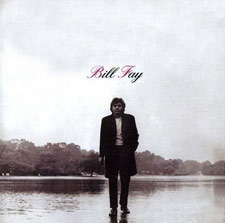
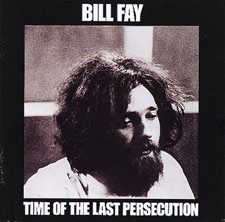 Bill Fay is the latest to undergo critical reassessment; he recorded two albums for Decca that were all but ignored upon release. It took 35 years before they became available in the CD format, and both – 1970’s self-titled debut, and the following year’s Time Of The Last Persecution – are gems.
Bill Fay is the latest to undergo critical reassessment; he recorded two albums for Decca that were all but ignored upon release. It took 35 years before they became available in the CD format, and both – 1970’s self-titled debut, and the following year’s Time Of The Last Persecution – are gems.
Like Nick Drake, Fay comes across as wise beyond his years. His self-titled debut showcased a remarkable talent, with a warm, acoustic approach enhanced by sparse but effective use of horns. The album’s opener, ‘Garden Song’ is a stunner – coming on quietly before building to a joyous wall of sound.
Fay’s subjects were mainly the disenfranchised and misunderstood; and he wrote from a decidedly Christian worldview, as apparent on tracks like ‘Be Not So Fearful’: “Be not so nervous / Be not so frail / Someone watches over you / You will not fail.”
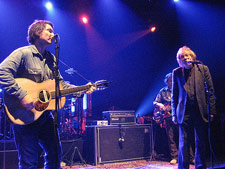
The song has been a highlight of Wilco’s live shows on and off for over a decade. Band leader Jeff Tweedy – who has long trumpeted Fay – managed to coax him into joining them onstage in London on two occasions; his first times onstage in over 3 decades.
The title track to Fay’s second release offers a dire warning; “You must know what it all really means / It is the time of the Anti-Christ…and you will wait for the ships in the air / And you wait for a sign like a trumpet sounding / And you go out and walk to the Christ.”
Many tracks, such as ‘Omega Day,’ and ‘Til The Christ Comes Back,’ are equally blunt. ‘Plan D’ foretells: “the sea shall rise and the skies open”; and ‘Pictures of Adolph Again,’ offers a choice: “Christ or Hitler, Christ or Vorster / Christ or all the Caesars to come.”
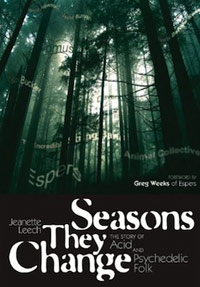
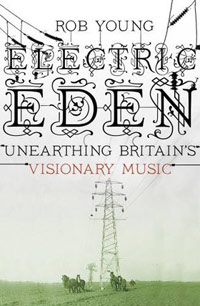 Fay is profiled in two new books; Electric Eden: Unearthing Britain’s Visionary Music (Faber), by Rob Young, sticks with its geographic mandate; but it stretches back over a century, covering well over a hundred acts in the process.
Fay is profiled in two new books; Electric Eden: Unearthing Britain’s Visionary Music (Faber), by Rob Young, sticks with its geographic mandate; but it stretches back over a century, covering well over a hundred acts in the process.
Jeanette Leech’s Seasons They Change The Story of Acid and Psychedelic Folk faithfully charts the one particular strain of folk music, from its inception in the 1960s to the current resurrection, with acts like Devendra Banhart and Joanna Newson exploring long forgotten roads once again.
© John Cody 2011